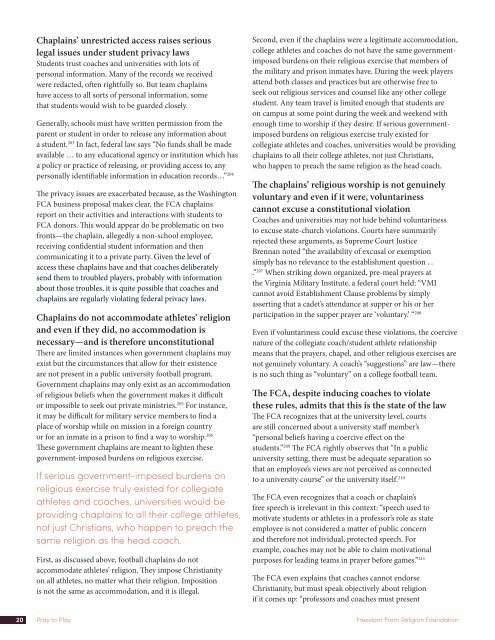Pray Play
PraytoPlay
PraytoPlay
Create successful ePaper yourself
Turn your PDF publications into a flip-book with our unique Google optimized e-Paper software.
Chaplains’ unrestricted access raises seriouslegal issues under student privacy lawsStudents trust coaches and universities with lots ofpersonal information. Many of the records we receivedwere redacted, often rightfully so. But team chaplainshave access to all sorts of personal information, somethat students would wish to be guarded closely.Generally, schools must have written permission from theparent or student in order to release any information abouta student. 203 In fact, federal law says “No funds shall be madeavailable … to any educational agency or institution which hasa policy or practice of releasing, or providing access to, anypersonally identifiable information in education records…” 204The privacy issues are exacerbated because, as the WashingtonFCA business proposal makes clear, the FCA chaplainsreport on their activities and interactions with students toFCA donors. This would appear do be problematic on twofronts—the chaplain, allegedly a non-school employee,receiving confidential student information and thencommunicating it to a private party. Given the level ofaccess these chaplains have and that coaches deliberatelysend them to troubled players, probably with informationabout those troubles, it is quite possible that coaches andchaplains are regularly violating federal privacy laws.Chaplains do not accommodate athletes’ religionand even if they did, no accommodation isnecessary—and is therefore unconstitutionalThere are limited instances when government chaplains mayexist but the circumstances that allow for their existenceare not present in a public university football program.Government chaplains may only exist as an accommodationof religious beliefs when the government makes it difficultor impossible to seek out private ministries. 205 For instance,it may be difficult for military service members to find aplace of worship while on mission in a foreign countryor for an inmate in a prison to find a way to worship. 206These government chaplains are meant to lighten thesegovernment-imposed burdens on religious exercise.If serious government-imposed burdens onreligious exercise truly existed for collegiateathletes and coaches, universities would beproviding chaplains to all their college athletes,not just Christians, who happen to preach thesame religion as the head coach.First, as discussed above, football chaplains do notaccommodate athletes’ religion. They impose Christianityon all athletes, no matter what their religion. Impositionis not the same as accommodation, and it is illegal.Second, even if the chaplains were a legitimate accommodation,college athletes and coaches do not have the same governmentimposedburdens on their religious exercise that members ofthe military and prison inmates have. During the week playersattend both classes and practices but are otherwise free toseek out religious services and counsel like any other collegestudent. Any team travel is limited enough that students areon campus at some point during the week and weekend withenough time to worship if they desire. If serious governmentimposedburdens on religious exercise truly existed forcollegiate athletes and coaches, universities would be providingchaplains to all their college athletes, not just Christians,who happen to preach the same religion as the head coach.The chaplains’ religious worship is not genuinelyvoluntary and even if it were, voluntarinesscannot excuse a constitutional violationCoaches and universities may not hide behind voluntarinessto excuse state-church violations. Courts have summarilyrejected these arguments, as Supreme Court JusticeBrennan noted “the availability of excusal or exemptionsimply has no relevance to the establishment question . ..” 207 When striking down organized, pre-meal prayers atthe Virginia Military Institute, a federal court held: “VMIcannot avoid Establishment Clause problems by simplyasserting that a cadet’s attendance at supper or his or herparticipation in the supper prayer are ‘voluntary.’ “ 208Even if voluntariness could excuse these violations, the coercivenature of the collegiate coach/student athlete relationshipmeans that the prayers, chapel, and other religious exercises arenot genuinely voluntary. A coach’s “suggestions” are law—thereis no such thing as “voluntary” on a college football team.The FCA, despite inducing coaches to violatethese rules, admits that this is the state of the lawThe FCA recognizes that at the university level, courtsare still concerned about a university staff member’s“personal beliefs having a coercive effect on thestudents.” 209 The FCA rightly observes that “In a publicuniversity setting, there must be adequate separation sothat an employee’s views are not perceived as connectedto a university course” or the university itself. 210The FCA even recognizes that a coach or chaplain’sfree speech is irrelevant in this context: “speech used tomotivate students or athletes in a professor’s role as stateemployee is not considered a matter of public concernand therefore not individual, protected speech. Forexample, coaches may not be able to claim motivationalpurposes for leading teams in prayer before games.” 211The FCA even explains that coaches cannot endorseChristianity, but must speak objectively about religionif it comes up: “professors and coaches must present20 <strong>Pray</strong> to <strong>Play</strong> Freedom From Religion Foundation


